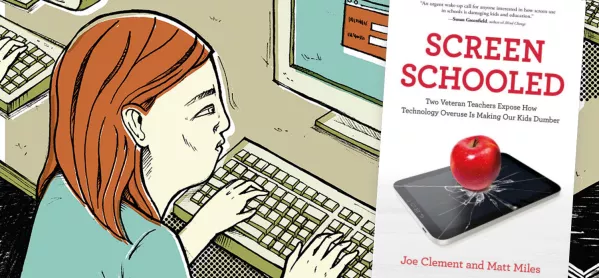- Home
- Book review: Screen Schooled: Two Veteran Teachers Expose How Technology Overuse Is Making Our Kids Dumber
Book review: Screen Schooled: Two Veteran Teachers Expose How Technology Overuse Is Making Our Kids Dumber

Ever had the feeling that tech in school isn’t all it’s cracked up to be? Joe Clement and Matt Miles’ Screen Schooled attempts to break down some of the problems that they, as teachers, perceive in the rush to cram schools with tech. Here they set out the arguments cited for doing so and the effect the digitalisation of classrooms is having on students.
Although primarily marketed to parents and focused on the US schooling system, the book gives an insight into some of the less desirable aspects of tech use that the two authors have witnessed in their classrooms; it may serve as a rallying cry to those in the UK teaching profession who have their doubts about wholehearted, unthinking adoption of tech in educational institutions.
The book casts an extremely critical eye on what the authors call the “assumptions perpetuated by the protechnology movement”. In doing so, they question the validity of mobile technology for learning when faced with the reality of the way young people work and think. The authors go on to discuss what tech use means to young people’s development; which critical skills are being lost; how it may be a factor in the decline of student mental health; and ends with an exploration of the US education industrial complex, where profit trumps actually helping children to learn. They also posit what an “ideal” school might look like without the huge focus on technology that they feel is the current paradigm.
At the end of each chapter, the book offers advice to parents on what they might do if they have concerns about their children’s technology use (related to the content of the chapter), both at school and at home.
Tallies with experience
Full disclosure: I’m a teacher for three days a week, but one of my other jobs is working in the ed-tech industry with businesses and organisations to develop and improve their educational resources. With that in mind, you might think it may be in my best interests to try to diminish some of the arguments that Clement and Miles make with regard to the harm that the overuse of technology is doing. But in all honesty, with my teacher’s hat on, that’s very difficult because much of what they describe tallies with my own experience.
Early on in the book is a description of a student’s daily school life and their interaction with technology, which, for my money, is one of the most accurate portrayals of how they actually use tech in school - as opposed to how we would like them to use it, or how companies would have us believe they use it. It rejects the utopian romanticism that often surrounds grand ideas in ed tech and starkly illustrates what, as my own experience attests, is really happening. It also brings to light the hurdles that digital technology can present in a young person’s life (often without them realising it).
Such authenticity of experience is apparent throughout the book. Time and again, common assumptions about tech use in schools are shown to be incongruous when set against the reality that Clement and Miles write about. It’s a perspective that I recognise as a teacher, and it goes a long way to making the book a valid read, if not, perhaps, a completely compelling argument. Because Screen Schooled is not without its issues. There’s an overreliance on anecdotage that is then used as evidence of particular trends and viewpoints. The sections on brain development struck me as a little broad and hurried. And the ed-tech industry is painted in very broad terms, whereas in my own experience, there’s more variety and folk working within it who are trying to do real good (although much of the authors’ cynicism is justified). There’s also a certain dismissal of student interests (gaming as esports, for example) that is bordering on curmudgeonly. But none of these gripes were enough to prevent me from frequently nodding my head in agreement with the writers.
Does the book sound the death knell for the rampant progress of tech in schools? No, it’s not focused enough for that. But what it does do is serve as an interesting counter to much of the evangelism of ed tech. For that reason alone, it should be commended.
How useful is it for teachers? For me, it solidified some of the ideas I already had and may serve as a useful reference if you think the tech push going on in your school might not be the panacea it’s often presented as. Perhaps slip a copy to a member of the senior leadership team before they’re about to buy another trolley of laptops because they’ve been told it’s the future.
Tom Starkey teaches English at a college in the North of England
Keep reading for just £1 per month
You've reached your limit of free articles this month. Subscribe for £1 per month for three months and get:
- Unlimited access to all Tes magazine content
- Exclusive subscriber-only stories
- Award-winning email newsletters



